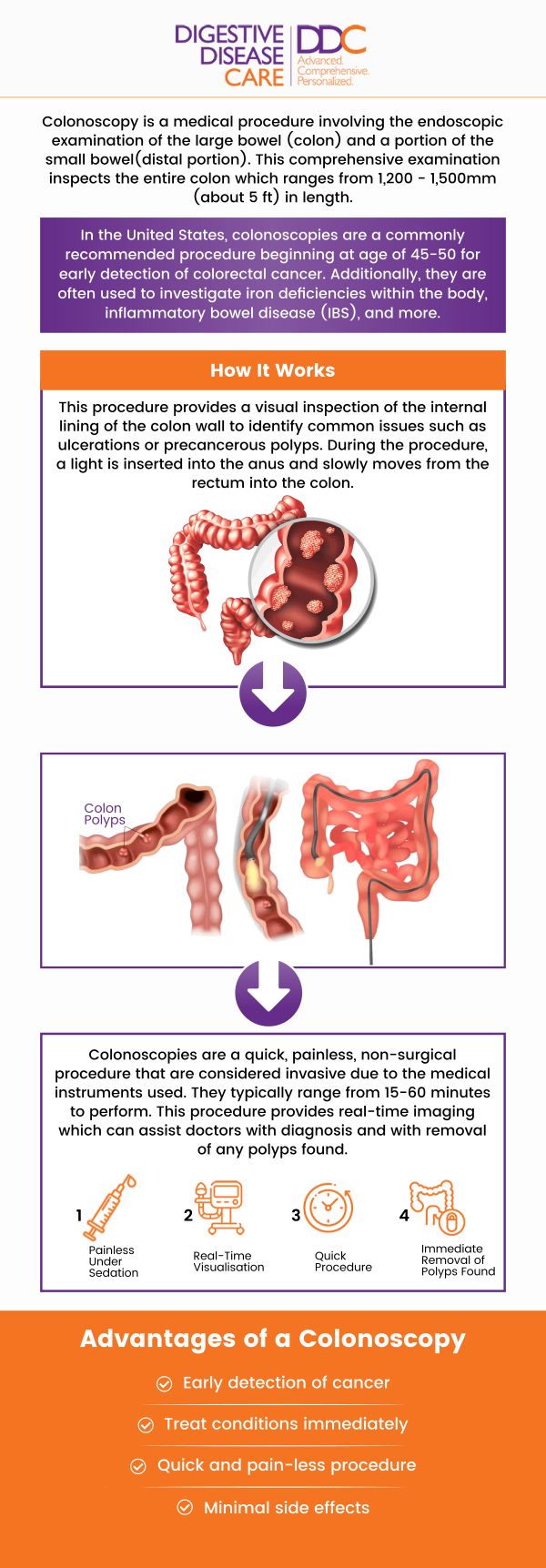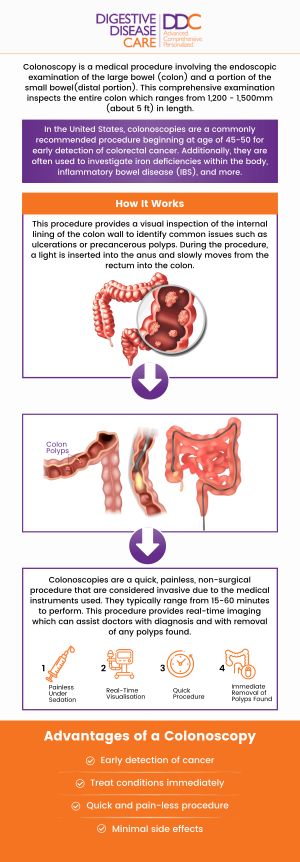Top Colonoscopy Specialist in Massapequa, NY
Colon cancer is one of the most common types of cancer in the world, with over one million new cases diagnosed each year. Fortunately, a colonoscopy is a highly effective screening method for detecting colon cancer early when it is most treatable. Visit Digestive Disease Care (DDC) today to get specialized and comprehensive care from a board-certified gastroenterologist in Massapequa NY. For more information, please contact us or request an appointment online. We are conveniently located at 1061 N Broadway, Massapequa, NY 11758.




Table of Contents:
Who needs a colonoscopy?
What is the biggest risk with a colonoscopy?
How much does a colonoscopy cost?
What are the benefits of a colonoscopy?
Where to find a board-certified gastroenterologist in Massapequa NY for a colonoscopy?
A colonoscopy is a procedure that involves the use of a colonoscope, a long, flexible tube with a camera and light on the end. The purpose of colonoscopy is to examine the lining of the colon and rectum for abnormalities, such as polyps or cancer. Before the procedure, patients are required to follow a special diet and medication restrictions to ensure the colon is clean and free of any obstructions. During the procedure, patients are given sedation to help them relax, and the colonoscope is inserted through the anus and into the colon. The doctor will carefully examine the lining of the colon and rectum for any abnormalities.
The American Cancer Society recommends that individuals begin screening for colon cancer at age 45. For those with a family history of colon cancer or polyps, or a personal history of colon cancer, polyps, or inflammatory bowel disease, screening may begin at an earlier age and be done more frequently. It is important to discuss your individual risk factors with your doctor to determine the appropriate screening schedule for you.
The benefits of a colonoscopy screening are numerous. It is considered the gold standard for detecting and preventing colon cancer, as it allows for the removal of polyps before they can become cancerous. However, there are limitations to this procedure, including the potential for false negatives and overdiagnosis. Stool-based tests and virtual colonoscopies are alternative screening methods that may be used in certain situations, but they are not as effective as a colonoscopy in detecting polyps.
It is a safe and effective procedure that can help save lives. By understanding the screening process, who needs it, and its benefits and limitations, individuals can make informed decisions about their health and well-being. It is important to discuss your individual risk factors with your doctor to determine the appropriate screening schedule for you.
A colonoscopy is a safe test. On average, there are only 2 serious complications per 1,000 surgeries. Risks of a colonoscopy include:
• Abdominal pain or discomfort
• Bleeding
• Adverse reactions to anesthesia
• Post polypectomy electrocoagulation syndrome
• Infection
• Intestinal perforation
The cost of a colonoscopy ranges from $1,250 to $4,800, with the average cost being $2,750. The average price in New York State ranges from $1,100 to $3,700.
Early detection is the key to successful treatment of colon cancer. A colonoscopy is an essential tool in detecting precancerous polyps before they become cancerous. By removing these polyps during the same procedure, a colonoscopy can prevent colon cancer from developing in the first place. Studies have shown that early detection increases survival rates and improves treatment options. For example, a study published in the New England Journal of Medicine found that colonoscopies reduced the incidence of colon cancer by 53 percent and the mortality rate by 68 percent.
A colonoscopy is the most accurate screening method for detecting colon cancer. Other screening methods such as stool tests and sigmoidoscopies have limitations in detecting cancer and polyps. Colonoscopies allow for the removal of polyps during the same procedure, reducing the need for additional procedures and follow-up appointments. Furthermore, a colonoscopy can detect other conditions such as inflammatory bowel disease and diverticulitis. A study published in the Annals of Internal Medicine found that colonoscopies were associated with a 77 percent reduction in the risk of developing colon cancer compared to no screening.
Many people are hesitant to undergo a colonoscopy due to concerns about discomfort or pain during the procedure, sedation, and recovery time. However, these concerns are often unfounded. The procedure is typically performed under sedation, and most patients experience little to no discomfort. Recovery time is minimal, with most patients able to resume normal activities within a day or two. Additionally, the risks of complications from a colonoscopy are very low, with serious complications occurring in less than 1 percent of cases. It is important to address these concerns and misconceptions to encourage more people to undergo this life-saving screening.
You can keep searching and come up with mediocre results of gastroenterologists from Google searches, or you can stop your search now and know you’ve landed on a top board-certified gastroenterologists’ website in Massapequa, NY. Contact us today to schedule a consultation with our board-certified gastroenterologist. We have convenient locations to serve you in Melville NY, New Hyde Park NY, Forest Hills NY, Jericho NY, Mineola NY, Lake Success NY, Babylon NY, East Setauket NY, Massapequa NY, Riverhead NY and BEYOND.

Check Out Our 5 Star Reviews


Additional Services You May Like

Additional Services You May Like
- Abdominal Pain
- Acid Reflux
- Barretts Esophagus
- Bloating
- Capsule Endoscopy
- Celiac Disease
- Colon Cancer Screening
- Colonoscopy
- Constipation
- Crohns Disease
- Diarrhea
- Diverticulitis
- Esophageal PH Monitoring
- Fatty Liver
- Fibroscan
- Gallstones
- Gastroenterologist
- Gastric Chest Pain
- Gluten Intolerance
- Hemorrhoid
- Hemorrhoid Banding
- Hepatitis
- Irritable Bowel Syndrome
- Lactose Intolerance
- Pancreatitis
- Polyps
- Rectal Bleeding
- Stomach
- Ulcerative Colitis
- GI Urgent Care





